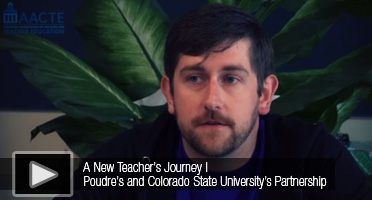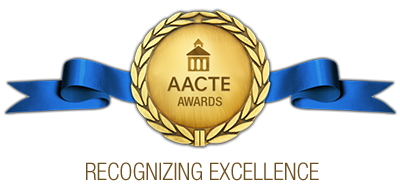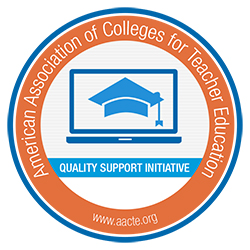06 Oct2015
By Deborah Koolbeck
The fall is ushering in more than a change in the weather in Washington this year. Multiple unpredicted changes in leadership have D.C. buzzing about what it all means.
- U.S. House of Representatives Speaker John Boehner (R-OH) resigned from Congress as of October 30, 2015.
- U.S. Department of Education Secretary Arne Duncan resigned as of December 2015.
- Chairman of the House Committee on Education and the Workforce Rep. John Kline (R-MN) will not seek re-election next year.
06 Oct2015
By Michelle Kotek

A new video in AACTE’s Research-to-Practice Spotlight Series focuses on a thriving partnership in Colorado from the perspectives of novice teachers prepared in a professional development school model. This blog highlights one teacher’s experience and offers insights from his assistant principal about the program’s success.
The forward-thinking partnership between Colorado State University (CSU) and the local Poudre School District employs a professional development school (PDS) model to prepare teachers who are ready to teach on Day 1. Their classroom is the classroom: Instead of taking their classes off site at the university, prospective teachers receive their lessons and then put them into practice in the same school building—with real kids and under the tutelage of a real teacher. While the program’s elements are fairly typical, its particular success comes from each course’s clinical component and support from a robust professional community.
06 Oct2015
By Angela Maynard Sewall
In his book Innovation and Entrepreneurship, Peter Drucker advised, “Don’t try to innovate for the future. Innovate for the present.” How helpful this wisdom is for everyone in the education field, whether PK-12 or higher education! For our students and our society, the future is now. Participants in the Wallace Foundation’s Principal Pipeline Initiative have taken that advice to heart as they have worked on practical, deployable strategies to improve how principals are recruited, prepared, and supported in urban schools, right now. The six districts and multiple higher education partners already are seeing improvement in student learning as a result of their work over the past few years.
On Thursday, October 15, the second webinar in AACTE’s free series on the Principal Pipeline Initiative will explore “Building the Partnerships” to bridge the differences among institutions and programs in the pursuit of their common goals. Like the first webinar, which discussed “Laying the Foundation,” this event will feature a panel of school and university leaders who’ve participated in the initiative. Panelists will discuss inputs needed, agreements and protocols, and the impact and outcomes of building new and stronger partnerships among the key groups.
06 Oct2015
By Hannah Maes
The first webinar in AACTE’s series on the Wallace Foundation’s Principal Pipeline Initiative drew some 110 participants last month. (The second, which will also be free of charge, will be held October 15; read Angela Sewall’s post about it here.) As they heard from the initiative’s panelists about their ongoing work to reform principal preparation through collaborations among higher education institutions and school districts, the webinar participants began to echo the presenters’ enthusiasm for the model’s potential if brought to a larger scale.
06 Oct2015
By James O’Meara and Sharon Robinson
On September 25, 2012, United Nations Secretary-General Ban Ki Moon launched the UN Global Education First Initiative (GEFI) for making quality education available to all children, young people, and adults. This year, on the third anniversary of the GEFI launch, leaders from AACTE answered his call for assistance by committing to revive a longstanding partnership with the International Council on Education for Teaching (ICET). But why ICET, and why now?
What Is ICET?
ICET is a nongovernmental organization (NGO) working with educator preparation providers (EPPs) globally to ensure all learners will have access to a high-quality education in which educators are appropriately qualified and recognized as motivated and committed professionals and practitioners.
05 Oct2015
By Guneev Sharma

This is the final week to submit applications for the AACTE Awards Program. All entries for Best Practice Awards and Professional Achievement Awards must be submitted online by Friday, October 9, at midnight EDT.
The selection process for the awards is by peer review, led by AACTE’s standing committees. I asked one committee chair, Kevin J. Graziano of Nevada State College, how the awards program contributes to the profession. (Graziano chairs AACTE’s Committee on Innovation and Technology, which is responsible for reviewing applications for the Best Practice Award for the Innovative Use of Technology.)
05 Oct2015
By Hannah Maes

What constitutes “quality” in assessment? Educators have to know how to design assessments and scoring rubrics that are appropriate to their students’ specific situations as well as fair, valid, and reliable.
AACTE’s Online Professional Seminar (OPS) #1: Building Quality Assessments addresses this question in a 3- to 4-week introductory course that is free and open to all educators. By connecting simultaneously with experts and their peers in the field, OPS participants get the chance to compare their experiences, learn from each other, and discover best practices for assessment design.
05 Oct2015
By Judy Boisen
Illinois has moved beyond the trial phase with edTPA, which became consequential here as of September 1, 2015. That’s why the recent state conference of the Illinois Teacher Performance Assessment Consortium (TPAC) was aptly named Moving Forward.
The event convened 131 educator preparation experts from 45 institutions and education organizations from across the state September 11-12 to discuss this next phase in our state’s edTPA journey.
05 Oct2015
By Elisa Palmer
Elisa Palmer, edTPA coordinator at Illinois State University, shares five takeaways from a panel on edTPA implementation during the Illinois Teacher Performance Assessment Consortium conference Sept. 11.
edTPA implementation can be overwhelming. But after 5 years of experience with more than 1,800 teacher candidates to complete the process, faculty and administrators from across our campus have helped us identify five key areas that, if addressed thoughtfully, might also lead to successful edTPA implementation on your campus.
02 Oct2015
By Whitney Watkins

Congratulations to September 2015 Holmes Scholar of the Month LaMarcus Hall!
Hall is a second-year doctoral candidate in the curriculum and instruction program at Purdue University. His research interest is cultural spaces for underrepresented minorities in higher education.
Since joining the Holmes Scholars Program at the beginning of this summer, Hall has made a breakout performance in his role as a Holmes Scholar at his institution. His nominator was incredibly impressed with his contributions to the field, as well as his array of other accomplishments.
30 Sep2015
By Guneev Sharma
How are you telling your story in the media? Although teacher educators may feel perpetually short on time given their duties across colleges and partner schools, it can be well worth the effort to establish yourself as a respected resource to local newspaper reporters, radio stations, and other media outlets. A prime time to reach out is when you take on a new leadership role, giving you a window of opportunity to introduce yourself to the community while presenting the outlet an expert connection to call on in the future.
Take Donald Easton-Brooks, former professor and dean of the Colleges of Business and Education at Eastern Oregon University, who recently became dean of the University of South Dakota (USD) School of Education. To mark his new appointment, Easton-Brooks sat for a recorded interview with a local news outlet, introducing himself to the local audience and promoting his vision for the school. Here are some of the points he shared in his 15-minute interview.
29 Sep2015
By Zachary VanHouten
In an apparent attempt to expand its reach beyond that provided by the partnership with U.S. News & World Report, the National Council on Teacher Quality (NCTQ) today unveiled a new interactive web site aimed at helping prospective teachers select a preparation program based on the ratings developed in NCTQ’s Teacher Prep Review.
The new web site, Path to Teach, translates the standards used in NCTQ’s Review into an at-a-glance scorecard for programs throughout the country.
29 Sep2015
By Hannah Maes and Tim Finklea
The 2015 Fall CAEP Conference in partnership with AACTE was held September 17-19 in Washington, DC, drawing a crowd of more than 1,300 education professionals to talk process, progress, and partnerships in quality educator preparation and accreditation. And it’s already time to submit session proposals for both of next year’s CAEPCons—they are due this Sunday, October 4, by midnight EDT.
29 Sep2015
By William Henk, Shelley B. Wepner, Sharon Lovell and Steven A. Melnick
Very little is known about education deans’ perceptions of what they think is important for their actual, effective performance on the job. To address this knowledge gap, we invite deans to participate in a national survey, which we are conducting with AACTE’s support, that will tap education deans’ beliefs about their essential ways of thinking, being, and acting.
But first, here is some more background. In short, effective leadership of a school, college, or department of education (SCDE) is vital in light of both internal and external forces that provide significant challenges for these academic units. For instance, in the realm of teacher preparation, education deans and directors must articulate their role as leaders of change in the field. This charge includes determining ways to provide concrete evidence of how their programs broaden and deepen the learning and mastery of their teacher and leadership candidates, and also the learning that takes place in the classrooms of their graduates.
29 Sep2015
By Sharon Leathers and Nanette Missaghi
New data illuminate the growing problem of the lack of diversity in the teacher workforce and reframe teacher diversity as an “educational civil right” for students. The Albert Shanker Institute’s recent report on The State of Teacher Diversity in American Education names teacher diversity as a crisis in the educator workforce—the very topic being addressed by the 10 institutions participating in a Networked Improvement Community (NIC) sponsored by AACTE. Specifically, AACTE’s effort seeks to identify strategies to boost the number of Latino and Black men in the education profession.
The authors of the Shanker report studied research and data on teacher diversity from 1987 to 2012 in nine cities in the United States. The report shows that for the period of 1987-2012, the percentage of the students of color changed from 23% to 37% (a 14 percentage point increase). For the same period, the percentage of teachers of color rose from 12% to 17%—a mere 5 percentage point increase. This shows that the rate of increase of students of color is far (almost three times) greater than the increase in the percentage of teachers of color. Therefore, this is a crisis not only in the decline of numbers of young people seeking education careers, but the absence of young people of color choosing the profession at the same rates as the number of students of color enrolled in the nation’s schools.









